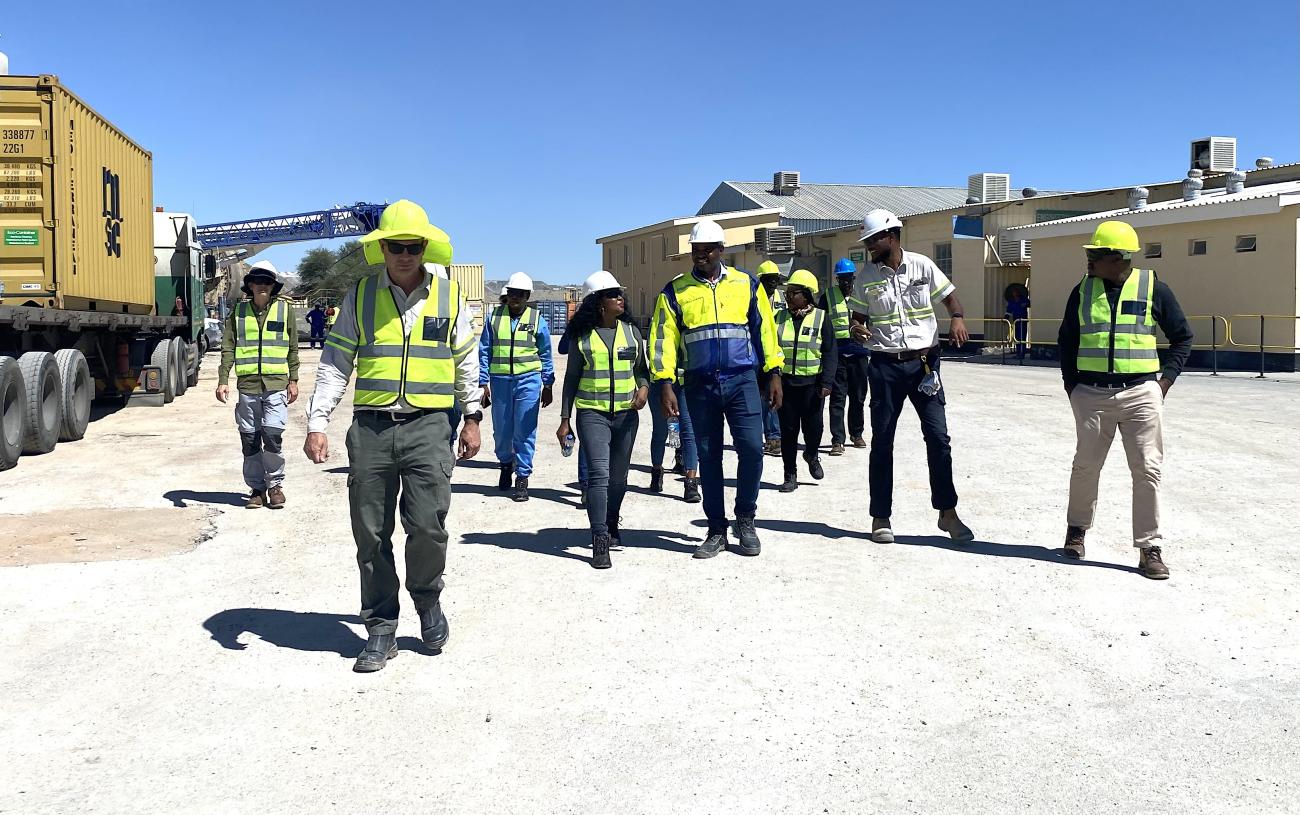UN Namibia Explores Partnership with QKR Navachab Mine for an area-based youth-focused development program in Karibib.

UN Namibia Explores Partnership with QKR Navachab Mine for an area-based youth-focused development program in Karibib.
KARIBIB, Namibia—In this arid mining town in central Namibia, the United Nations is evaluating how to leverage its technical expertise in development to support the Corporate Social Investment (CSI) development efforts of QKR Navachab Gold Mine in the Karibib area.
En route from the Resident Coordinator Office retreat, Ms. Hopolang Phororo and the team made a detour to visit development projects undertaken by QKR Navachab Gold Mine as part of an envisioned strategic partnership discussion between QKR Navachab Mine and the United Nations Namibia, which aims to uplift and empower Karibib Town and surrounding areas through smart, sustainable development and educational empowerment with a particular focus on Youth.
Recognizing the importance of a strategic partnership with the private sector to accelerate the SDGs, the UN system in Namibia is seeking entry points for strategic partnerships. QKR Navachab Mine brings financial resources and a strong commitment to the economic development of the Karibib area, aligning with many of the Sustainable Development Goals (SDGs). However, because it is a mining company it lacks the technical expertise necessary for broader developmental challenges. Conversely, the United Nations offers substantial development technical know-how through its specialized agencies, both locally and globally. It benefits from a worldwide network that facilitates access to international knowledge and solutions, and it sets critical norms and standards, such as WHO health guidelines. The UN’s efforts are coordinated under the One UN System, led by the Office of the UN Resident Coordinator. However, the UN faces financial limitations in Namibia, attributed to the country's classification as an Upper-Middle Income Country (UMIC).
The partnership aims to leverage the unique strengths of both organizations to amplify development impact in the Karibib area, especially the youth. “Empowering youth and marginalized communities through education, skills training, and job creation is crucial for Namibia's sustainable development, and we value the input and expertise of all our partners," said Ms. Phororo.
The mine has invested in several development programs in Karibib, i.e., educational infrastructure, and is currently working on projects to improve local schools. These projects include fencing, enhancing sports facilities, and exploring the construction of a science lab to provide students with practical knowledge and application.
"We have made progress, but we recognize that more needs to be done to create an enabling environment for our youth and the vulnerable populations, such as people with a disability," said Mclyn Kasale, QKR Navachab Mine’s Communications Manager, who facilitated the visit of the UN Resident Coordinator team. "We are also looking at investing in disability-friendly infrastructure across Karibib, in addition to what the Mine is currently doing by providing wheelchairs to those in need. Currently, the facilities in the town lack disability accessibility features such as ramps for wheelchair users."
One successful grassroots effort is a community garden managed by local women and former domestic workers. With training and microfinance opportunities, such agricultural projects could provide vulnerable populations with nutrition, skills, and the needed income.
Access to healthcare also remains a challenge, with residents in Karibib traveling long distances to either Windhoek or Swakopmund to access hospital services, as Karibib only has a health clinic at the moment. This is why QKR Navachab Mine aims to construct a local medical facility/hospital, which will be its biggest CSI project and is estimated to be in the millions. “For a project of this magnitude, the UN’s technical expertise in health through its specialist agencies such as WHO, UNAIDs, and UNFPA will play a critical role in setting standards and using successful case studies in other parts of the world to ensure that the medical center is set up in a holistic manner that caters for both the public and private patients incorporating some of the key health challenges such as HIV, sexual and reproductive health and mental health” said Mclyn Kasale, QKR Navachab Mine’s Communications Manager
"An integrated area-based program can drive progress across education, employment, health, and food security sectors. This can be used as proof of concept of a successful area-based partnership that can be replicated in other towns and regions in the country," noted Errolice Tjipura, UN Namibia's partnerships officer.
“As climate change exacerbates water scarcity and environmental pressures, initiatives promoting sustainable resource use and economic diversification beyond mining will be vital, “said Hildebrand Willem-Ore Processing Manager-QKR Navachab Mine
“This partnership with the UN can have a catalytic effect on QKR Navachab Mine's current CSI programs, and we are looking forward to working with the UN. We need to agree on the starting point going forward without wasting too much time; we need to get started,” said Ingo Schneider, QKR Navachab Mine's Chief Financial Officer (CFO).
"UN Namibia can share best practices, catalyze funding, and facilitate public-private collaboration to make Karibib's development more inclusive and sustainable in the long term,” Ms. Phororo added.
In the coming months, the UN country team in Namibia will further assess local needs and stakeholder capacities to design and implement an impactful joint program that supports Namibia's development priorities in partnership with QKR Navachab Mine.
--End—







